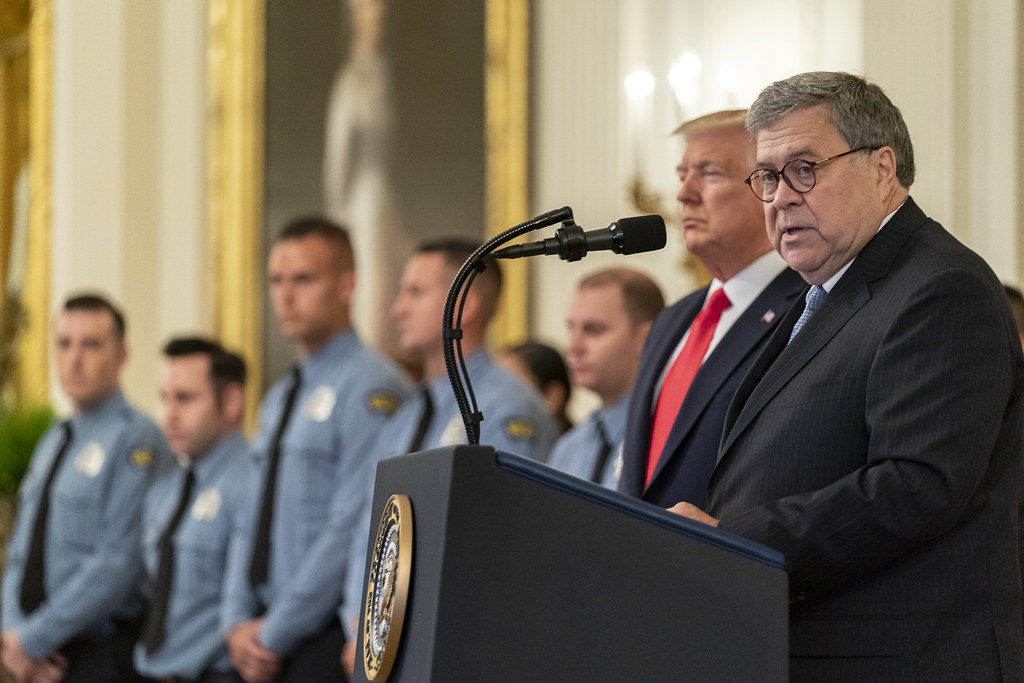Why the Attorney General's Meddling on Antitrust Issues Matters
A Justice Department veteran testified last week that attorneys in the Antitrust Division were ordered to open unfounded investigations targeted at companies Attorney General Barr dislikes. If true, this is deeply troubling.

Published by The Lawfare Institute
in Cooperation With

Last week, two career Justice Department prosecutors testified before the House Judiciary Committee, detailing brazen political interference in their work. Aaron Zelinsky, who prosecuted Roger Stone, got most of the attention. Stone, a friend of the president, received improper consideration from Attorney General William Barr and an interim U.S. attorney in the form of a last-minute (and more favorable) sentencing recommendation from the government. Zelinsky—and three fellow career prosecutors—appropriately refused to lend their names to that shadowy endeavor and withdrew from the case.
As disturbing, but less well publicized, was the testimony of John Elias, a Justice Department veteran. He described a different type of meddling from the attorney general.
Elias works in the Antitrust Division—a vital piece of the Justice Department that garners less attention and fewer headlines. As Elias stated, his division “protect[s] competitive marketplaces across [the] economy.” As part of that mission, they review “every large-dollar merger taking place in the United States.” Because there were more than 2,000 proposed mergers in each of the last two fiscal years, Antitrust Division personnel rely on established guidelines to prioritize their work and preserve limited resources. Those guidelines have operated well and have helped to ensure—in previous administrations—the apolitical nature of their work.
Corrupt republics threaten and imprison rivals (or worse) and reward friends. At least, that is how we think of corrupt republics. But Elias described something equally odious: unfounded antitrust investigations targeted at companies the attorney general dislikes.
Elias told the Judiciary Committee that proposed mergers in the cannabis industry “[did] not meet established criteria for antitrust investigations.” The targeted companies had low market shares in a fragmented industry. Yet his group was ordered to open investigations into these disfavored companies. Elias added that “[w]hile these were nominally antitrust investigations, and used antitrust investigative authorities, they were not bona fide antitrust investigations.”
If Elias is correct, that is deeply troubling. I am not defending that industry; the nature of it is irrelevant here. I imagine Elias would be equally troubled—I would be—if antitrust resources were used improperly to target hospitals, airlines or energy producers. So, even if these unfounded investigations were ultimately dropped, as Elias explained, what is the harm? Why should we care? For several reasons.
First, unfounded investigations have a real cost for the companies, their investors and their employees. In one investigation that Elias described, the Antitrust Division obtained 1.3 million documents from the files of 40 employees of a particular company. To produce material subpoenaed by the Justice Department, companies routinely hire lawyers to preserve and review documents and to interview employees. This process can be slow, burdensome and expensive, and affiliated costs can easily run into the hundreds of thousands of dollars, if not more.
Further, as Elias noted, the underlying merger collapsed and the stock price of one of the companies during the pendency of the investigation declined by about one-third. Did the investigation trigger those results? Perhaps. At the very least, the investigation had real costs and real consequences for the targeted companies. And that is patently unfair.
Second, the threat of an investigation can upend an industry. Companies closely monitor enforcement and regulatory trends in their industry. When Companies A and B propose a merger and are investigated, despite market factors that should not normally trigger Antitrust Division review, what do Companies C and D see, think and do? Do they proceed with their merger? There is a very real chance that improper investigations have ripple effects throughout a sector of the economy. Is that what the attorney general intended?
Indeed, the president has threatened other industries—traditional and social media outlets come to mind—with the loss of licensure and other regulatory actions. Those threats have mostly been hollow, as are so many of this president’s words. And certain industries are clearly better equipped to stand up to a bullying president. Media outlets have the First Amendment and jurisprudence on their side. But not all companies in all industries have significant legal advantages or even the resources to litigate an advantage. And smaller companies will be at a comparative disadvantage.
Third, by focusing on frivolous cases, meritorious cases wither. Remember, the Antitrust Division has limited resources to assess more than 2,000 proposed mergers each year. They can look closely at only a small fraction of that number. But, as Elias noted,
[a]t one point, cannabis investigations accounted for five of the eight active merger investigations in the office that is responsible for the transportation, energy, and agriculture sectors of the American economy. The investigations were so numerous that staff from other offices were pulled in to assist, including from the telecommunications, technology, and media offices.
There is a zero-sum game aspect to that arrangement. You cannot simply add more capacity to do all the important things that need to be done. If you are directed to do something frivolous, then something meritorious may be overlooked.
Is it possible Elias was wrong, and that the investigations in his division were appropriate? Perhaps there was no untoward political interference? Consider this:
Elias and his colleagues raised concerns about opening unwarranted investigations to the leadership of the Antitrust Division. The head of that division, according to Elias, acknowledged at a September 2019 all-staff meeting “that the cannabis industry is unpopular ‘on the fifth floor,’ a reference to Attorney General Barr’s offices in the DOJ headquarters building.”
As Elias noted to the Judiciary Committee in a model of understatement, “[p]ersonal dislike of the industry is not a proper basis upon which to ground an antitrust investigation.” Indeed, it is not.



.jpg?sfvrsn=676ddf0d_7)

